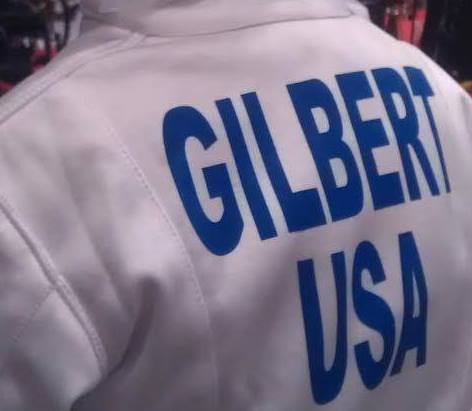
Paralympics '16/Training and Competition
Donation protected

When my daughter, Elle, was 6-years-old, she sustained a crush injury to her right leg from a golf cart accident (she was struck, as a pedestrian, by a 13-year-old driver). She had a double compound fracture (tibia and fibula) and a circumferential degloving injury (her muscles were basically pulled down her bone, like a sock) complicated by compartment syndrome. She endured 5 surgeries, a blood transfusion, and thankfully, the doctors were able to save her leg. She had pins and rods, a cast, a wheelchair, and then a walker, and a year of rehabilitation. For the most part, she recovered. There are certain things she can and cannot do.
In Summer 2013, I enrolled her in a fencing camp at the North Atlanta Fencing Center. She fell in love with the sport of fencing (which says a lot, because we aren't a very athletic family - we are artists). Unfortunately, her leading leg is the one that was injured. She soon found that she didn't have the stamina to be an able-bodied fencer. When she called me at work to tell me that she qualified to be a Category A Wheelchair Fencer, I thought she was joking, and said, "Please, Elle. You're just out of shape. You're not disabled." She replied, "Mom, you don't know how my leg feels." It was that moment that I realized that I really *didn't* know how her leg felt or what her capabilities truly were. It seemed odd to me because she walks, can run three miles or so, and can do most things able-bodied people can do. I never really thought that she had a disability.
The last evening of her week long summer fencing camp, I met with her coaches, Julio Diaz and Dennis Aspy. They were so excited about her. I wanted to cry. She has long arms, she's tall, she's smart, and the perfect age to groom for the 2016 Paralympics in Rio, Brazil, and the 2020 Paralympics in Tokyo, Japan.
Since then, she's been training under Coach John Terris, U.S. Paralympic Coach Julio Diaz, and Team Captain Dennis Aspy, at Shepherd Center and NAFC (North Atlanta Fencing Center) in Atlanta. Accompanying her to her lessons at the Shepherd Center has really opened my eyes to disabled athletes. As an able-bodied person, I never fully understood or regarded how amazing disabled athletes are. It really humbled me. I was ashamed, really. Ashamed that I take for granted being physically able to do so much more than I do. To tell you the truth, I couldn't even come close to what these athletes have accomplished. One should never regard disabled or Paralympic athletes as a "step down" or "not as good" as able-bodied athletes or Olympians. If anything, they're a step up. Seriously, if you only knew. Take some time, and just watch them. *Really* watch them. It will bring tears of pride to your eyes.
Shepherd Center sponsors her under its fencing team, Shepherd Swords. They cover some costs, but there are still a lot of costs that I must cover.
Elle's dream is to be a Paralympian. If you can, please donate and/or share this information. We need your help to make it happen. We have the strongest fencing team right now. The strongest in 10 years. We're up against other countries whose governments actually support their athletes and pay the costs of training and competition.
Thank you, and go, USA!
Organizer
Cyndi Rivers
Organizer
Atlanta, GA


